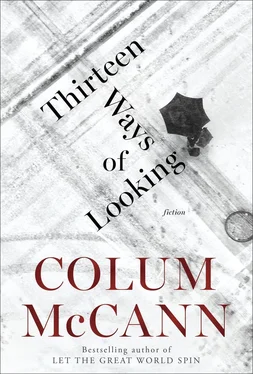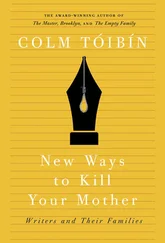On the fifth day she sees him.
It is late afternoon. She sits in the corner of the shop, her hands curled around a cold coffee cup. The newspaper is spread out in front of her. The headlines of a foreign country. The shop is quiet, monitored by the series of cameras set up high around the corners.
She is about to finish her coffee and return to Ian’s apartment when the bell sounds out on the door.
A gust of cold wind. The small hint of a cough. She bends forward and grips the counter. He glides past her. It takes a moment to even realize that it is him. The back of his hair is perfectly combed. His suit is rumpled but smart. There is a click from the heels of his shoes. At the fridge he takes out a cold coffee drink. He has, under his arm, a Spanish-language paper. Why did she not see him walking along the street? Where has he appeared from? He says something, she is sure, to the Pakistani shopkeeper: she cannot quite hear. He drops a coin in the small tray at the side of the register.
She removes her dark cardigan, folds it in her lap, swivels on the chair, places her hands in the well of her skirt, watches him in the shop-window reflection, all of him reversed, right to left.
A smell of aftershave rolls from him as he passes. Is it enough to have seen him? To just be here? I should allow myself, in the obedience of faith, to be used by God’s love. Make of myself a prayerful absence.
She reaches out to tug the side of his jacket. The flap end, close to his hip. The cloth feels so terribly expensive.
He turns. A surge of heat pulses through her. A bristling of the hair on her arms. World without end. The mole on his cheek. The tilt of his eye.
— Euclides Largo?
— Yes?
She can tell straight away that he has become the sort of man who is happy to be recognized. His skin has grown lighter, as if he has come indoors, drawn the curtains on that other life. He arches an eyebrow, reaches out a political hand. She does not take it. She grips her cardigan instead. No language at all. To bless him now, to forgive him, to let him go on his way?
— You’re at the Institute?
— Yes.
— I saw you on television. Spanish language. In New York.
— A wonderful city.
He favors the door a moment, glances outside, but then turns: And you are…?
— I’m just — an interested observer.
He leans back as if to put her in focus.
— Journalist?
— I’m far too old to be interested in journalism. I’m just watching from a distance, Mr. Largo.
— But you speak Spanish?
— Just a little.
He peels back the cellophane tab from the lid of the drink, taps the bottom of the container against the heel of his hand. It strikes her that he wears no rings on his fingers. No marriage, then, no children.
A tightness cramps her chest when he brings the coffee to his mouth. She lets out a small sound: something trapped, hidden. He nods as if about to leave, but she leans forward on the stool. Am I supposed to directly bestow my forgiveness, Lord? Am I to reconcile with evil? Is that what is being asked of me? Is that what You demand after all these years? Apokatastasis panton. The restoral of all things. To what, then, shall I be restored? Is there no wisdom? Is that what I have to learn? That there is finally none at all?
It has, she notices, begun to rain outside, a steady patter against the window.
She speaks slowly, the words emerging, small stones of sound: The television said you’re working at the draft of a treaty?
— We are.
— You’re aligned with the miners?
— And their families, sí. We’re struggling, but we are, how you say, we are getting along, bit and bit. We’ll have a statement—
— Poco a poco.
— So, you do speak Spanish?
— It’s coming back to me. And your English? It’s good now.
— Excuse me?
— Your English is good now, Carlos.
She stands. She is a full head taller than him. Still she does not offer her hand.
— Excuse me?
— It’s good, Carlos. Your English.
— Euclides, he says. Largo.
— Sister Beverly Clarke, she says.
He glances over his shoulder toward a waiting car outside, a small fan of smoke rising from its exhaust, the rain bouncing off the roof. Two young boys enter the shop: when they remove their hoods one of them looks remarkably to her like the boy who played the piano in Victoria Station.
— You’ve become a man of peace, Carlos.
— I’m not sure — excuse me — I think you’ve maybe mistaken me—
— I don’t think so.
— You must excuse me. I have a car waiting.
It strikes her how ordinary and extraordinary both, then, this moment, a street-corner shop, the rain, a London sidestreet, her rapist, thirty-seven years ago, the sound of a distant piano, a pigeon flapping through a railway station, her brother, the books on the floor, a collision, that ancient river in Galway where she made her decision to join the Church, so young then, the way the light shone even on the underside of the bridge, bouncing up from the copper-colored Owenriff.
— I’m not here to hurt you, Carlos. You have more important things to do. I’m not here to ruin what you are doing.
— What is it you said your name was again?
— Sister Beverly Clarke.
— Well, Sister Beverly Clarke, it’s a pleasure to meet you, but I think you’ve mistaken me—
— But I’d like to know how you achieved it.
— I’m afraid you’re wasting your time.
— Where did you find it, Carlos? That grace?
— Encantado. Let me go. My jacket. You’re holding my jacket.
Beverly is surprised to feel the tug in her fingers, that it is true, she has brought him closer, that there is the faint smell of coffee from his breath, that she has bridged this space, caught him so unaware.
She lets go of him, hears the high ping of the cash register and the fumble for money, a laugh from one of the young boys as they leave the shop.
— Do you recognize me?
— Por supuesto no le…
She touches the top button on her blouse, opens it. He steps back, attempts an ease into his face.
— Are you sure, Carlos?
— No me llame Carlos.
— I’m interested in what it means to you. When you sit there and you talk about peace?
A second button, the necklace at her fingers. The shopkeeper has not moved, his dark hands spread wide on the countertop.
— I would be happy to talk to you in my office, Miss—
— Sister Beverly.
— You could arrange it with my secretary.
— You’re doing good work, Carlos.
— Stop it.
— I’m not going to harm that.
He leans toward her: No sé quién diablo eres, tu.
She opens the third button on her blouse, her flesh cold to the touch. He turns, panicked, toward the shopkeeper, then glances back to Beverly.
— No puedes hacer esto.
— It healed, see?
— Soltame.
No embarrassment. No shame. She is surprised by the banality of it, how naked, how ordinary it is to her, the small ruin of her breast in her hand.
— Que quieres conmigo?
— Nothing.
— Tell me what you want.
— Nothing, Carlos. Nothing. I just want you to know that I’m here, I exist, that’s all.
He backs, panicked, toward the door. A small hitch in his step as he leaves. He grasps for the handle. The door swings slowly closed behind him.
She watches through the window as Carlos yanks open the rear door of a car. Something apparitional in the moment. A man immune to himself. It looks to her as if he is stepping into a caisson of his own loneliness. He slams the door. The tinted window powers down.
She begins to rebutton her blouse.
From the rear seat Carlos stares out. He gestures with an open hand and the car lurches forward, the small rope of exhaust fumes dispersing into the air.
Читать дальше












